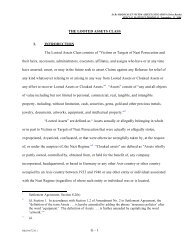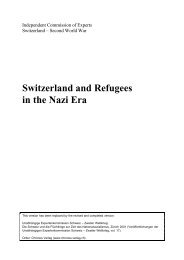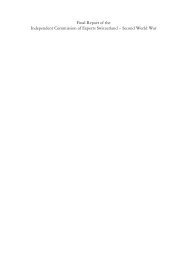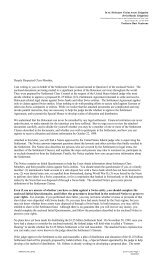Switzerland and Gold Transactions in the Second World War
Switzerland and Gold Transactions in the Second World War
Switzerland and Gold Transactions in the Second World War
You also want an ePaper? Increase the reach of your titles
YUMPU automatically turns print PDFs into web optimized ePapers that Google loves.
Interim Report on <strong>Gold</strong> 24 Chapter 1<br />
M<strong>in</strong>ister of <strong>the</strong> Economy, 6 allowed imports only to <strong>the</strong> extent that <strong>the</strong>y could be paid for by<br />
exports. Imports were to be determ<strong>in</strong>ed by economic necessity, <strong>and</strong> countries which would<br />
accept sufficient quantities of German products were to be given preferential treatment. 7<br />
The Nazis’ efforts at autarchy could not solve Germany’s foreign currency shortage. The goal<br />
of significantly <strong>in</strong>creas<strong>in</strong>g <strong>the</strong> German economy’s self-sufficiency was not atta<strong>in</strong>ed. 8 In<br />
addition, Hitler, who had reserved <strong>the</strong> power s<strong>in</strong>ce October 1933 to appo<strong>in</strong>t members of <strong>the</strong><br />
Govern<strong>in</strong>g Board of <strong>the</strong> Reichsbank, gave priority to war preparations after 1936. Schacht was<br />
thus replaced by Wal<strong>the</strong>r Funk 9 as M<strong>in</strong>ister of <strong>the</strong> Economy at <strong>the</strong> end of 1937 <strong>and</strong> as<br />
President of <strong>the</strong> Reichsbank at <strong>the</strong> beg<strong>in</strong>n<strong>in</strong>g of 1939. Funk, who from 1933 to 1937 served <strong>in</strong><br />
<strong>the</strong> Reich government as press secretary <strong>and</strong> as state secretary <strong>in</strong> Joseph Goebbels’ M<strong>in</strong>istry<br />
for Propag<strong>and</strong>a, acted as Hitler’s economic advisor <strong>and</strong> was a confidant of Hermann Gör<strong>in</strong>g.<br />
In 1938 he was appo<strong>in</strong>ted M<strong>in</strong>ister of <strong>the</strong> Economy <strong>and</strong> Plenipotentiary for <strong>the</strong> wartime<br />
economy <strong>and</strong> one year later President of <strong>the</strong> Reichsbank <strong>and</strong> Plenipotentiary of Economic<br />
Affairs. Schacht, to no avail, resisted <strong>the</strong> project of f<strong>in</strong>anc<strong>in</strong>g <strong>the</strong> wartime economy with<br />
unsecured public debt.<br />
With <strong>the</strong> attack on Pol<strong>and</strong>, <strong>the</strong> need <strong>in</strong>tensified for armaments <strong>and</strong> raw materials which could<br />
only be acquired abroad aga<strong>in</strong>st payment <strong>in</strong> foreign currencies or gold. The latter <strong>in</strong>cluded<br />
petroleum, iron ore, manganese, <strong>and</strong> tungsten. The ma<strong>in</strong> suppliers were Portugal, Romania,<br />
Sweden, Spa<strong>in</strong>, <strong>and</strong> Turkey. 10 The Reich’s requirement for freely-convertible foreign currency<br />
<strong>in</strong>creased, as a result of payments for <strong>in</strong>ternational services <strong>and</strong> capital transactions which<br />
cont<strong>in</strong>ued after 1933, <strong>and</strong> which were <strong>in</strong> part ma<strong>in</strong>ta<strong>in</strong>ed until 1945. These <strong>in</strong>cluded <strong>the</strong><br />
servic<strong>in</strong>g of foreign currency bond issues (primarily <strong>the</strong> Dawes <strong>and</strong> Young bonds, <strong>and</strong> <strong>the</strong><br />
Austrian League of Nations bonds which were taken over <strong>in</strong> 1938), <strong>the</strong> transfer of capital<br />
yields such as <strong>in</strong>terest <strong>and</strong> dividends to foreign <strong>in</strong>vestors, as well as license royalties, premiums<br />
<strong>and</strong> professional fees, <strong>and</strong> pensions for German citizens resid<strong>in</strong>g abroad. In this connection, a<br />
lead<strong>in</strong>g spokesman of Swiss <strong>in</strong>dustry referred to <strong>the</strong> estimated sum of SFr. 212.2 million for<br />
annual payments by <strong>the</strong> German Reich to his country alone. 11<br />
Germany had five pr<strong>in</strong>ciple ways of acquir<strong>in</strong>g foreign exchange:<br />
1. Secur<strong>in</strong>g universally convertible foreign currency through sales of gold to foreign central<br />
banks <strong>and</strong> commercial banks.<br />
2. Exports <strong>and</strong> services for customers abroad.<br />
3. The sale of looted goods such as works of art, precious stones or negotiable securities.<br />
6<br />
7<br />
8<br />
9<br />
10<br />
11<br />
For biographical <strong>in</strong>formation, see Appendix 1.<br />
Boelcke 1994, p. 23.<br />
Boelcke 1994, p. 158; Volkmann 1989, pp. 430 ff.<br />
For additional biographical <strong>in</strong>formation see Appendix 1.<br />
Boelcke 1994, pp. 131, 159, 174.<br />
Accord<strong>in</strong>g to <strong>in</strong>formation from He<strong>in</strong>rich Homberger, Director of <strong>the</strong> H<strong>and</strong>els- und Industrievere<strong>in</strong> [Swiss Association<br />
for Trade <strong>and</strong> Industry]. See SDD, vol. 15, p. 72, note 8. For biographical <strong>in</strong>formation on Homberger, see Appendix 1.







